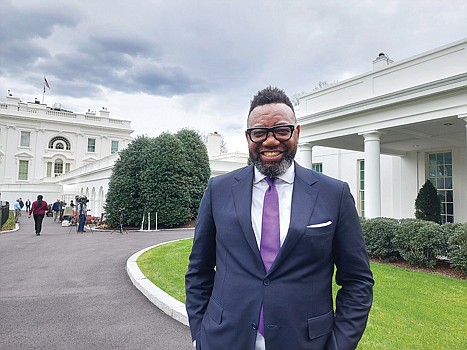Religious affairs expert Thomas Bowen moves from city of Washington to White House
Adelle M. Banks/Religious News Service | 3/28/2024, 6 p.m.

WASHINGTON - In the month since moving from Mayor Muriel Bowser’s administration to the White House, the Rev. Thomas L. Bowen keeps encountering familiar faces.
“It’s kind of funny, because there hasn’t been a meeting yet that I have not walked into a room and known somebody from previous interaction, be it through the mayor’s office or years gone by with the Children’s Defense Fund,” said Rev. Bowen, who was recently appointed a senior White House adviser charged with keeping faith leaders informed about national policy.
There’s an old adage that our nation’s capital is a small town, but in Rev. Bowen’s case, the phenomenon may have as much to do with his previous interactions: A graduate of Morehouse College who studied at the University of Chicago Divinity School, the Ohio native worked in religious advocacy alongside now-Sen. Raphael Warnock and Chicago Pastor Otis Moss III before moving to the Children’s Defense Fund, a nonprofit championed by First Lady Hillary Clinton and founded by Marian Wright Edelman.
In 2002, he joined the staff at Shiloh Baptist Church, a historic Black congregation, where he is minister of social justice. There he became known as a voice for the faith community in the district, and in 2016, Mayor Bowser made it official by naming him director of religious affairs.
At both the local and national level, Rev. Bowen’s portfolio has gone beyond the realm of faith. He also was the director of African American affairs for the District of Columbia and led its Office on Fathers, Men and Boys. At the White House, his responsibilities in the Office of Public Engagement also include outreach to “the diaspora of white, ethnic countries in Europe, such as Ireland, Italy, Greece.”
Rev. Bowen already has been in touch with the Rev. Barbara Williams-Skinner, a Washington-area faith leader and coordinator of Faiths United to Save Democracy, who describes Rev. Bowen as “the consummate example of faith in action.”
Rev. Williams-Skinner said she hopes one of his primary aims will be to arrange a meeting, something the Black faith community has long sought, between their leaders and President Biden.
After years of seeking to advocate with the president about anti-poverty legislation and raising the minimum wage, more recently Black church leaders have joined ardent cries for cease-fire in the Hamas-Israel war.
“Black clergy are the most consistent, faithful messengers of hope for vulnerable people, for reluctant voters, particularly younger voters,” said Rev. Williams-Skinner, who also co-chairs the National African American Clergy Network. “And it is a little bit shortsighted not to close the gap in that communication.”
Rev. Bowen is now in the position of mediating with his former colleagues on these issues. “We always try to share with them how we are leading the humanitarian efforts in Gaza, and how we continue to try to negotiate, broker with both sides,” he said.
While shifting to national domestic and international issues, he will still be acting as a clergyperson in the city that he has long served. “Whenever there is a funeral of an unhoused person, and the pastor is unable to do it, Rev. Bowen is always our go-to person,” said the Rev. George Mensah, executive minister at Shiloh Baptist, in an email to RNS.
Rev. Bowen said he conducted a funeral at Shiloh for “a beloved church member who unfortunately was experiencing homelessness” three weeks after starting his White House job.
“One of my commitments in ministry is I believe that everyone deserves a proper homegoing,” said Rev. Bowen, who also leads the church’s 7 a.m. prayer service via conference call on weekdays.
Rev. Bowen also takes part in the celebrations of different religious groups, including iftars, the meals when Muslims break their fasts during Ramadan, and Diwali, the Hindu festival of lights.
“I think that we all can be better if we can learn from our neighbors and co-workers, how they celebrate their faith, and how it informs their life,” said the minister, who is affiliated with the American Baptist Churches USA and the Progressive National Baptist Convention. Muslim and Christian clergy spoke of his concern for the safety of their houses of worship amid threats and violence.
Imam Talib M. Shareef, president of Masjid Muhammad, also known as The Nation’s Mosque, in Washington, described Rev. Bowen as “very responsive” when religious communities had been targeted with hatred.
“Any time an incident has occurred where a faith community was the target of violence, he would always check on us, and most of the time with a physical visit,” the imam said in an email message about Rev. Bowen, who he said has regularly visited the mosque.
The Rev. William H. Lamar IV, pastor of Washington’s Metropolitan African Methodist Episcopal Church and co-chair of the Washington Interfaith Network, also spoke of Rev. Bowen’s “very pastoral presence,’’ recalling how he supported the congregation “when the Proud Boys desecrated our congregation” by tearing down and destroying its Black Lives Matter sign.
Rev. Bowen expects to continue his public engagement work with people of no faith, including “nones,” or those with no particular affiliation, as well as atheists and humanists.
“I know that there are people who have something to offer in this space, who may not be associated with any organized religion,” he said.
Rev. Bowen said he also hopes to continue to address issues of security for houses of worship in his new role that interacts with the White House Office of Faith-based and Neighborhood Partnerships. He has long collaborated with the Department of Homeland Security office that administers the Nonprofit Security Grant Program, which provides funding to congregations at risk of attack.
“I don’t think that houses of worship can be told too much,” he said about the need for protection and planning to shore up their buildings, “because there are a lot of vulnerable congregations out there.”






